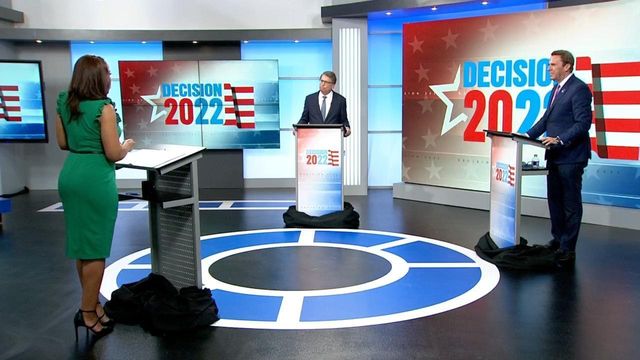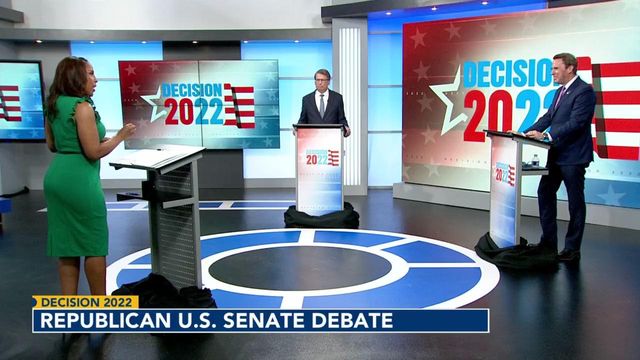7 takeaways from WRAL's U.S. Senate GOP primary debate
Former North Carolina Gov. Pat McCrory and former U.S. Rep. Mark Walker took aim at one candidate not on stage: U.S. Rep. Ted Budd. Budd is the frontrunner and has the support of former President Donald Trump.
Posted — UpdatedTwo of North Carolina’s top Republican U.S. Senate candidates squared off Thursday in a WRAL News debate, where they shared their thoughts on the future of the GOP, their pathways to victory and how they’d tackle inflation if elected.
North Carolina Gov. Pat McCrory and former Greensboro-area U.S. Rep. Mark Walker—who are looking to fill a seat from retiring Sen. Richard Burr—frequently took aim at one candidate not on stage: U.S. Rep. Ted Budd, the frontrunner in the race, who chose not to attend the debate.
Budd’s top campaign adviser, in a statement Thursday, intimated that the candidate was criss-crossing the state talking to voters. Budd was in the Triangle for lunch and dinner events, including a visit with Donald Trump Jr., the former president’s son.
Here are seven takeaways from the event:
McCrory and Walker agreed to participate in the prior debate and the one WRAL hosted. Both candidates criticized Budd’s refusal to participate.
“If a candidate doesn't come to a debate … he doesn't care about you.” McCrory said. “He doesn't care about North Carolina and he doesn't care for freedom and democracy.”
Jonathan Felts, Budd’s top campaign adviser, said the congressman on Thursday instead chose to speak with voters.
“Ted Budd is focused on finishing his 100-county tour of NC before the primary so he can speak directly to voters in all 100 counties and ask for their vote,” Felts said. “Some candidates like to look voters in the eye and ask for their vote, while other candidates prefer the comfort and convenience of green rooms and TV studios.”
Felts did not respond to individual attacks Budd’s opponents made during the debate.
Budd attended a lunch event on Thursday in Raleigh with Donald Trump, Jr., the former president’s son, Felts said. After that, Budd went to a dinner in Johnston County.
Walker accused Budd’s advisers of not allowing him to debate.
“He hasn't shown up for the first two [debates], Walker said during the debate. “He won't show up tonight. And I'll say this right now: He will not show up for the final two either. You know why? Because they won't allow him,” Walker said.
“North Carolinians witnessed yet another chaotic display of Republican infighting at tonight’s debate,” said Kate Frauenfelder, a spokesperson for the North Carolina Democratic Party. “Between the desperate attacks on stage and Ted Budd skipping out to attend a high-dollar, country club fundraiser, the GOP primary is revealing to voters every day that none of these candidates deserve to represent North Carolina in the U.S Senate.”
“I'm a Ronald Reagan conservative who believes in character and accomplishments and results, and that’s why I’m running for Senate” McCrory said during the debate.
Budd and Walker, meanwhile, are highly supportive of former President Donald Trump. Budd in June 2021 got an endorsement from Trump. At a rally on Saturday held by Trump in Johnston County, Budd also secured the support of the state’s top Republican executive officeholder, Lt. Gov. Mark Robinson.
Walker said he was a highly regarded “America-first, pro-Trump policy candidate and “highest-rated conservative ever to serve the GOP leadership,” without citing who gave the rating.
McCrory declined to say whether he would’ve accepted Trump’s endorsement if it were offered.
“I haven't asked for anyone's endorsement, nor will I because that makes me dependent upon other people,” McCrory said.
In an interview during candidate filing, Budd called Putin a “very intelligent actor” but also labeled the Russian president as “evil.” Budd, in a later interview with WRAL News, spoke more critically of Putin. “I would say, right now, he's a thug, he’s evil and he has to be stopped,” Budd said.
“Congressman Ted Budd said that Putin is an intelligent actor. He also said he was evil to be fair, but he's not an intelligent actor. An intelligent person doesn't bomb hospitals.”
Walker also criticized Budd’s remarks, saying the congressman’s words could have been used as propaganda by Russia.
“When a member of Congress says anything flattering or complimentary, what happens is it gets taken and used as propaganda against some of the people who are our own allies,” Walker said. “It’s not very bright, plus members of Congress are warned not to do it. For Mr. Budd to do that, it shows an ineptness that he’s not ready to serve.”
Walker has welcomed the support of U.S. Rep. Madison Cawthorn, who has called Ukrainian President Volodymyr Zelenskyy a “thug.” In an interview last month, Walker told WRAL he disagreed with Cawthorn’s comments.
During the debate on Thursday, Walker said, “When it comes to that kind of rhetoric, no, I don’t buy into it.”
Cawthorn is also among the members of Congress prohibited from entering Russia.
McCrory, who spent more than two decades rising up the ranks of the Duke Energy utility company before becoming governor in 2012, said he would make the U.S. less reliant on foreign energy and encourage companies to get Americans back to work.
“As your governor, what I did was reduce unemployment compensation, quit giving away free money and get people back to work.” McCrory said, noting that he presided over a large drop in unemployment.
Walker said he brought a balanced budget amendment to the floor of the U.S. House when he was in the chamber and cited increased government spending as a cause of higher costs North Carolinians are experiencing.
“Until we get our spending under control, we're not going to get a handle on inflation,” Walker said.
Club for Growth Action has committed to spend at least $14 million to help Budd win. Joe Kildea, a spokesman for the group, said $8.4 million had been spent, as of March 30, and that the group is willing to increase its spending as needed.
“Congressman Budd is owned by a special interest group out of D.C.,” McCrory said.
Walker accused the group of trying to buy a reliable vote in the U.S. Senate, citing the $14 million in pledged spending.
“They're for low taxes and economic growth for our country and I support those same principles as well,” he said.
The measure that was signed by McCrory required people to use the restroom of the gender assigned at their birth at public schools and government buildings, prompting several organizations to cancel big events or major expansions in the state. Asked if he regretted signing the bill, McCrory replied, “No.”
“Those restrictions are also on the baby that would like to be born,” he said.
McCrory suggested Congress shouldn’t be involved in legislating the issue. “We’ll see what the Supreme Court has to say, but it ought to be left up to the states, not the federal government,” McCrory said.
Related Topics
• Credits
Copyright 2024 by Capitol Broadcasting Company. All rights reserved. This material may not be published, broadcast, rewritten or redistributed.






